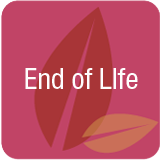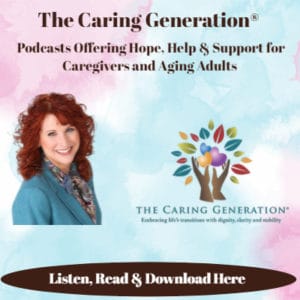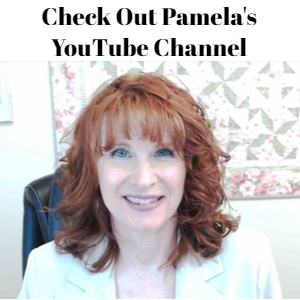Medical Prognosis: Physician, Caregiver, and Older Adult Communication
By Pamela D. Wilson, MS, BS/BA, NCG, CSA
 Physician communication of medical prognosis is rarely discussed. Older adults and their caregivers are unaware of the consequences and seriousness of medical conditions.
Physician communication of medical prognosis is rarely discussed. Older adults and their caregivers are unaware of the consequences and seriousness of medical conditions.
Discussion of medical prognosis falls into the uncomfortable area of “don’t ask, don’t tell.” Family caregivers and aging adults don’t ask because the information received may eliminate hope or be emotionally distressing. Physicians don’t tell the full consequences of a medical prognosis because they feel uncomfortable. Physicians are unskilled at giving what they perceive to be bad news.
Concerns exist by physicians, caregivers, and older adults about accurate communication of healthcare diagnoses. Physicians feel that information is relayed accurately, but not accepted or ignored. Being an active participant in healthcare is the responsibility of the patient.
 Disagreements about Medical Prognosis
Disagreements about Medical Prognosis
What happens when caregivers or older adults disagree with physicians about the prognosis of health conditions and the likely consequences? Does denial prevent being proactive about current health situations? How much information would older adults and caregivers like to be able to plan for eventual end of life care ?
Do gaps in the giving and receiving of information, from physicians to older adults result in the lack of understanding. Is there a concern about health literacy? Are older adults or caregivers in denial?
It may be that caregivers and older adults require more thorough explanations to understanding medical prognosis. Physicians are rushed. Who can take the time to support understanding?
When physicians provide a prognosis, the older adults may be in denial. An opportunity to change bad health habits may be ignored. Why change now? Exercise? That sounds like too much work!
This is the part of human nature that physicians cannot change. We make good and bad choices. The consequences become our our daily experience with feeling physically good or bad.
Poor Bedside Manner
A lack of sensitivity exists by the healthcare industry to the daily issues faced by family caregivers and aging adults. Information gaps exist between medical diagnoses and day to day care in the home and in care communities. I experienced these gaps when I was the medical decision maker for my clients.
Some physicians who do tell have poor bed-side manner. These physicians are viewed by caregivers and aging adults as uncaring, dismissive, egotistic, or unsympathetic. (1) Other physicians base opinions on limited information about a patient that later proves to be incorrect. A certain level of caution in predictions is practical rather than offering definite predictions that something will occur on a certain date.
For example, a physician tells a caregiver that an aging parent must be moved to assisted living because the care will be better in assisted living than care provided at home. The recommendation was made because the physician assumed the care provided at home may not have been adequate. Not enough questions were asked.
Believing that the physician must be right, the family caregiver moved the parent to assisted living. The aging parent’s health rapidly declined due to limited care in the assisted living community. Death resulted within a matter of weeks. The caregiver blamed the physician for a poor recommendation.
Physician Scope of Practice
The recommendation of an aging parent to move to assisted living represents a situation where the physician made a recommendation outside of what is called the “scope of practice”. The scope of practice describes the procedures, actions, and processes that a healthcare practitioner is permitted to undertake in keeping with the terms of a professional license.
Physicians are not experts at services offered by nursing homes, assisted living communities, or in-home care services. A physician attempting to be helpful to caregivers and older adults, outside of the scope of practice, may offer recommendations that result in more harm than good. These discussions are best referred to a healthcare consultant or expert.
Scope of practice exists in other specialties that have licenses and who follow professional standards. For example financial planners and attorneys. One would not — or should not ask a financial planner or attorney how to repair a plumbing issue in the home. At best if a discussion occurs, a recommendation to contact a plumber is a practical response. Limits to expertise exist in all specialties.
Distrust and Poor Communication Between Physicians and Older Adults
Because of poor communication and faulty recommendations, distrust exists between physicians, older adults, and caregivers.
A study in the Journal of Palliative Medicine (2) reports that,
Many family caregivers reported that a physician never told them the patient’s illness could
not be cured (20.8%), never provided life expectancy (40%) or reported that the illness was incurable, and never discussed using hospice (32.2%).
A gap exists between communicating a diagnosis and offering practical solutions for ongoing care. Differences exist in the physician offering information and caregivers and older adults understanding the information. This places the responsibility to understand and to ask questions on the shoulders of the caregiver and the older adult. Investigation of options also belongs to the caregiver and the older adult.
A situation of poor communication existed in my family when my mother was diagnosed with bladder cancer. This happened years before I became a caregiving advocate. My family, even with my sister being a nurse, did not know to ask about medical prognosis. Questions should have been asked–but were not– about: success rates of surgery, recovery time, recommendations for rehabilitation, unexpected things that might go wrong, and quality of life for my mother.
If I knew then what I know today, my mother may have lived longer than 3 weeks after surgery. She died of sepsis, a serious bodily infection, after surgery for bladder cancer.
Early Discussions about Healthcare Diagnosis and Prognosis are Beneficial
Family caregivers and older adults are better self-advocates when they understand a medical diagnosis. The tendency is for physicians to prescribe medications rather than explain the basis for the medication, potential side effects, or options for resolving the medical concern. Prescribing a medication is a quick and easy fix. Explaining why health habits should change may be a much longer discussion.
If family caregivers and older adults are made blatantly aware of the seriousness of a medical condition or the consequences of not taking actions to support health, the outcome of care situations may be different. Older adults may choose to be more proactive about diet, exercise, and health care with the hope of active, rather than unhealthy, retirement years.
Discussions about the progression of a chronic disease when discussed years before a terminal diagnosis, might change the course of a life. Caregivers and older adults should be routinely made aware of effects of a diagnosis on life expectancy. This will avoid conversations about end of life concerns being less of a surprise. If communication was ongoing, physicians may not have to give bad news but to remind of prior options recommended and declined.
Conversations may be, “yes the doctor cautioned me this might happen,” rather than surprise that years of cigarette smoking resulted in a diagnosis of lung cancer. Or surprise that a heart attack resulted from being overweight, having high blood pressure, and high cholesterol. Refusals to change poor health habits has consequences.
Participating in Care
Caregivers and older adults must be offered the opportunity to fully participant in care. Physicians should provide the hard facts at the time of diagnosis with the goal of no surprises. Offering background information about the progression of disease, the consequences of treatment, and potential changes in habits supports patient choice in self-care.
By advancing health literacy and discussions of diagnoses, appropriate planning for health, financial, social and emotional needs may occur. Health literacy discussions may reduce caregiving chaos and shock during retirement years.
Fewer surprise discussions may occur about a lack of funds to pay for care, surprise that care is needed in the home, or that a move to assisted living is required. Caregivers might experience less stress if ongoing discussions occurred rather than discussions only after a health crisis.
Receiving Bad News
We are not yet to the point of discussing health literacy and moving the conversation to positive aging discussions. Bad news will be relayed by physicians. Caregivers and older adults will fail to ask questions. Difficult healthcare choices will be made. Caregiving chaos will occur. Nothing goes as planned.
Being told that a situation has no hope is never a pleasant conversation. Some older adults give up and die when provided with a life ending diagnosis. Other older adults, who desire to live, remain hopeful and take actions to maintain the best quality of life possible.
The response to bad news depends on approach to life. Some view problems as something to solve. Others view problems as situations that cannot be changed. Bad news is also relative. What may be bad news for one person may be perceived differently by another. The best scenario is to receive the news, ask questions, and determine a path forward.
Being Proactive Supports Planning
Being proactive allows family caregivers and older adults to prepare for end of life. Discussions may be held in a calm manner with the goal of avoiding chaos and dramatic situations. Care desires can be written down. Preferences can be stated to avoid confusion and support clarity. Medical directives and legal documents may be updated at the time a change in health diagnosis is provided.
It is better to be realistic about steps to take to ensure that care and comfort are provided. No crystal ball exists to say that life will continue for another 6 months, 3 months, or 1 month. Older adults have improved with palliative and hospice care. Some improve to the degree that end of life care is no longer needed.
If the healthcare situation is truly nearing end of life—through identified progression of stages that the body is beginning to shut down—palliative care is an option prior to hospice. Learning about these services and accessing them earlier, up to 6 months prior to a projected end of life, rather than later is beneficial.
Families have a concern that signing up for hospice means no care will be provided.This is a valid concern. The level of care differs by hospice company. It is important to interview several companies to make certain that the company chosen matches the goals of the older adult and the family.
Family Gatherings
Being made aware than life is short as the result of a health diagnosis, allows family gatherings. Taking that last picture, making a phone call to say goodnight, and participating in other activities to support positive memories occur before end of life. Death will always be a personally emotional matter. We all respond differently.
The memories we make with our loved ones provide positive memories that will stay with us after they are gone. We may be reminded of a loved one by hearing a song playing on the radio, looking at a photo on a desk, eating a favorite meal or participating in a family tradition. Life is short. Memories are forever. Make memories today.
Sources:
(1) Cagle, John G. et. al., “If You Don’t Know, All of a Sudden, They’re Gone: Caregiver Perspectives About Prognosis Communication for Disabled Elderly Adults,” J Am Geriatr Soc 64:1299-1306, 2016.
(2) Cherlin, Emily et. al., “Communication Between Physicians and Family Caregivers About Care at the End of Life: When Do Discussions Occur and What is Said?” J Palliat Med. 2005 December: 8(6): 1176-1185.
© 2018 Pamela D. Wilson, All Rights Reserved.
Pamela D. Wilson, MS, BS/BA, CG, CSA, is a national caregiving thought leader, caregiving expert, advocate, and speaker offering online support and programs for caregivers seeking support and advice for the care of aging parents, spouses, and other family members. Pamela supports adults, age 50+, with positive aging advice and on-line programs to advance health literacy and self-advocacy. Collaboration with professionals in the specialty areas of estate planning, elder law, and probate, financial planning, and healthcare raises awareness of and sensitivity to stressful family caregiving and healthcare issues.



